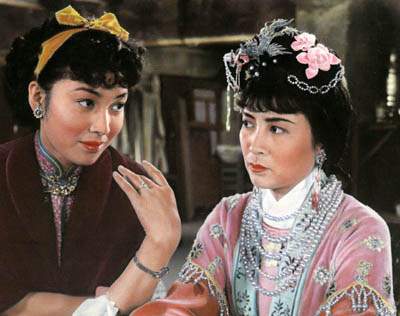
WUTAI JIEMEI
(Stage Sisters, Cina/1964) R.: Jin Xie. D.: 112'. V. cinese. Digitale
[Due sorelle] T. int.: Stage Sisters. Scen.: Lingu Wang, Jin Xie, Jin Xu. F.: Zhenxiang Chen, Daming Zhou. M.: Lijun Zhang. Int.: Fang Xie (Chunhua Zhu), Yindi Cao (Yue hong Xing), Nan Deng (A Xin), Ran Ding (ufficiale Pan), Lin Dong (Ni San Laoye), Qi Feng (Xing Shi Fu), Ai-sheng Gao (Ji ang Bo), Wei Li (Tang), Jingyi Luo (Yu Guiqing), Ji Ma (Qian Dakui). Prod.: Li Ding per Shanghai Film Studios DCP. D.: 112'. Col. Versione cinese con sottotitoli inglesi / Mandarin version with English subtitles
Da: Shanghai Film Museum Restaurato in 4k nel 2014 da Shanghai International Film Festival con il contributo di Shang hai Film Group, Shanghai Film Thecnol ogy Co., Shanghai Film Museum, presso il laboratorio L'Immagine Ritrovata, con il sostegno di Jaeger-LeCoutre / Restored in 4k in 2014 by Shanghai International Film Festival, in collaboration with Shang hai Film Group, Shanghai Film Technology Co., Shanghai Film Museum, sponsored by Jaeger-LeCoutre, at L'immagine Ritrovata laboratory
Wutai Jiemei è un film inaspettatamente fluido e sottile, emotivamente plausibile. Ed è anche una storia ambiziosa e d'ampio respiro che accompagna le protagoniste dalle province al distretto teatrale di Shanghai e viceversa. Alcuni set un po' angusti riflettono la scarsità di risorse, ma la padronanza tecnica di Xie e il livello generale della recitazione eguagliano come minimo la qualità di un modesto dramma hollywoodiano degli anni Cinquanta o Sessanta. Fang Xie e Yindi Cao sono rispettivamente Chunhua e Yuehong, le sorelle del titolo: in realtà sono due amiche conosciutesi negli anni Trenta quando Chunhua, in fuga da un matrimonio combinato, è stata accolta dalla compagnia itinerante dell'Opera cinese di cui faceva parte Yuehong. Le due belle ragazze, diventate star di provincia, finiscono nei guai quando un proprietario terriero le invita a cantare a casa sua e si aspetta che Yuehong offra a lui e ai suoi amici un'esibizione privata. La giovane riesce a scappare, ma Chunhua, accusata di aver insultato il nobile, viene incatenata a una colonna sulla pubblica piazza dalle guardie nazionaliste. Per Fang Xie è una delle tante occasioni di mostrare il proprio talento drammatico. Ma per buona parte del film le crisi morali e i conflitti di classe sono simili a quelli descritti dal cinema americano degli anni Trenta e Quaranta. I valori di Chunhua e dei suoi nuovi amici comunisti differiscono molto poco dai valori degli abitanti del Midwest che finiscono a Los Angeles e a New York nei nostri drammi proletari. E il femminismo del film non è reso meno autentico dalle motivazioni politiche che lo sottendono. Il realismo emotivo fu probabilmente una delle ragioni per cui dopo l'avvio della Rivoluzione culturale il film fu proibito e Xie fu arrestato. L'evidente piacere con cui il regista ritrae il mondo equivoco degli anni Trenta a Shanghai, sua città natale, probabilmente non aiutò.
Mike Hale, Two 'Sisters' From Time of Mao Star Again, "The New York Ti mes", 25 settembre 2009
Two Stage Sisters is unexpectedly fluid and subtle, with emotions that ring true. It's also a sweeping, ambitious narrative that moves from the provinces to the theater district of Shanghai and back again. Some cramped staging may reflect a lack of resources, but Mr. Xie's technical assurance and the overall level of the acting are the equal of at least a modest Hollywood drama of the 1950s or '60s. Xie Fang and Cao Yindi star as Chun- hua and Yuehong, the sisters of the title, who are actually friends brought together in the 1930s when Chunhua flees an arranged marriage and is taken in by the traveling Chinese opera company to which Yuehong belongs. The two good-looking young women become provincial stars, which gets them in trouble when a local landowner invites them to sing at his house and expects Yuehong to stay and give him and his friends a private recital. She escapes, but in the aftermath, Chunhua, who takes the rap for having insulted the gentry, is chained to a post in the public square by the Nationalist gendarmes. It's one of many chances for Ms. Xie to flash her talent for noble suffering. But through much of the film, the moral crises and the class conflicts play out almost exactly as they did in American pictures of the 1930s and '40s. The values of Chunhua and her new Communist friends differ very little from the values of the Midwesterners drawn to Los Angeles and New York in our own proletarian dramas. And the film's feminism is no less genuine for being politically motivated. Its emotional realism was most likely one of the reasons that the film was banned and Mr. Xie imprisoned once the Cultural Revolution began. The obvious delight Mr. Xie took in portraying the 1930s louche life in Shanghai, his hometown, probably didn't help.
Mike Hale, Two 'Sisters' From Time of Mao Star Again, "The New York Times", 25 September 2009

Tariffe:
Aria condizionata
Accesso disabili
Tel. 051 522285











